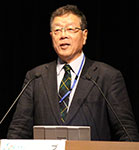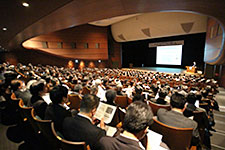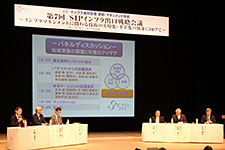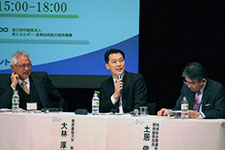SIP Website, Cabinet Office:
http://www8.cao.go.jp/cstp/panhu/sip_english/sip_en.html
SIP “Infrastructure Maintenance, Renovation and Management” (Program Director (PD): Prof. FUJINO Yozo, Distinguished Professor, Institute of Advanced Sciences, Yokohama National University) focuses on matching “the needs of maintenance and management of civil infrastructures, such as roads, railways, ports and airports,” with “technology development seeding.” Its aim is to develop “the technologies that infrastructure managers would want to use” and to apply them widely in society after verifications.
The “SIP Exit Strategies Conference” is set up to study the exit strategies of the programs such as issues or mechanisms to promote the regional implementation of the study results in society. The delegates of this conference are the PD, sub-PDs, expert advisors, SIP participating researchers and general researchers/engineers. The conference provides discussion and information sharing.
At the 7th conference held on Jan. 20, 2017, “practical applicationand commercialization of infra-management technologies”w was presented and discussed.
Prof. ROKUGO Keitetsu (Gifu University) presented the role of local universities in social implementation at the regional government (technical presentations, field tests). Prof. Rokugo also shared the SIP’s technical developments in the North-Shinetsu region based around Gifu University and human resources of young researchers/engineers.
In the panel discussion, the area-specific issues were presented by Hokkaido University, Tohoku University, Kansai University, Nagasaki University and University of the Ryukyus. At the general meeting, the PD, sub-PDs, expert advisors and all other participants discussed how to overcome issues of market formation, new technology introduction and human resources development, against the shortage of financial resources and the rapidly aging civil infrastructures. During these meetings, some opinions were expressed that, to achieve technology implementation on regional infrastructures, it is important to obtain the understanding and support of various people in the area including the inhabitants as well as universities, local governments and related companies”
Furthermore, Prof. OBAYASHI Atsuomi (Keio University) pointed out the necessity of “competitive advantage” for the exit strategies as an incentive of a for-profit project, from the view of organizational management. Mr. DOI Toshihiko (Japan Foundation for Regional Vitalization) presented the collaboration structure that is effective for “securing the budget required for continuing the project,” which is necessary for the asset management of the regional governments, citing the actual accounts of Narashino City, Chiba Prefecture and Sendai City.
Held in a crowded venue exceeding 400 people, the conference provided a meaningful opportunity in which the speakers and various participants delivered frank opinions.
*SIP: Cross-ministerial Strategic Innovation Promotion Program
The Cross-ministerial Strategic Innovation Promotion Program (SIP) is a national project for science, technology and innovation, spearheaded by the Council for Science, Technology and Innovation as it exercises its headquarters function to accomplish its role in leading science, technology and innovation beyond the framework of government ministries and traditional disciplines. The SIP has identified 11 themes that will address the most important social problems facing Japan, as well as contribute to the resurgence of the Japanese economy. Each project is led by an experienced and talented program director who is responsible for end-to-end focused research and development, and facilitating coordination among government, industry, and academic entities. These directors have been charged with guiding their project from basic research to practical application and commercialization, and ultimately to a clear exit strategy. The SIP focuses on science, technology and innovation, which drive our nation’s economic growth and vitality and which will dramatically change society. Incidentally, projects related specifically to health and medical innovation fall under the direction of the Headquarters of Healthcare Policy.

Prof. FUJINO Yozo at the greeting speech

Presentation of Prof.
ROKUGO Keitetsu, Gifu University

Panel discussion:
“Challenges for regional implementation and countermeasures”

Q&A at the general discussion.
JST, an integrated organization of science and technology in Japan, establishes an infrastructure for the entire process from the creation of knowledge to the return to the society. For more information, visit http://www.jst.go.jp/EN/